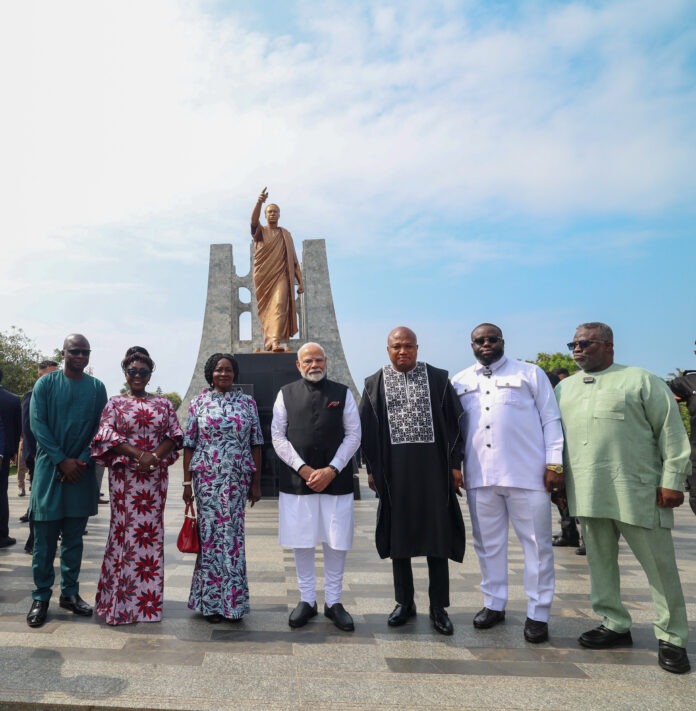In a diplomatic outreach laced with cultural symbolism and economic assertions, Prime Minister Narendra Modi’s visit to Ghana marked a significant moment in India-Africa relations. The first such visit by an Indian PM in over three decades, the engagement was notable for its multi-layered messaging, from heritage gifts and parliamentary diplomacy to economic forecasts and tributes to shared democratic icons.
The visit began with a gesture steeped in tradition as Modi presented handcrafted Bidriware vases to Ghana’s top leadership. The artefacts, known for their intricate silver inlay on black metal, were positioned as a tribute to India’s timeless craftsmanship and as symbols of friendship between the two nations.
In a historic address to the Ghanaian Parliament, Modi spoke of India’s pluralistic identity, pointing out that the country operates with over 2,500 political parties, 22 official languages, and thousands of dialects. Describing India as the “mother of democracy,” he underlined that the strength of a democracy lies in its capacity for debate, dissent, and dialogue. The speech drew visible appreciation from lawmakers, with two Ghanaian MPs even donning Indian traditional attire to mark the occasion.
The Prime Minister used the platform to highlight India’s economic trajectory, stating that the country contributes around 16% to global growth and is on track to become the third-largest economy in the world. He pointed to domestic reforms, stable governance, and a thriving start-up ecosystem as key drivers of this progress. The assertion comes at a time when international forecasts project India’s rise to the top three global economies within the decade.
While economic themes dominated much of the discussion, the visit also included gestures of solidarity with Ghana’s historical struggles. Modi laid a wreath at the memorial of Kwame Nkrumah, the revered Ghanaian independence leader, paying respects in a solemn ceremony that reflected shared post-colonial aspirations.
Later, in recognition of his contributions to strengthening bilateral ties, Ghana conferred its highest civilian honour on Modi, the “Officer of the Order of the Star of Ghana.” The award was described as a testament to growing strategic, economic, and cultural cooperation between the two countries.
Throughout the visit, India’s emphasis on democratic values, economic reform, and cultural exchange remained consistent. The government’s intent to position India not only as an economic partner but as a like-minded democracy with deep historical roots was clearly reflected in both the formal and symbolic elements of the trip.
The outreach also held implications for broader South-South cooperation. Modi’s call for stronger representation of developing nations in global governance institutions echoed sentiments shared across the Global South, especially in the wake of shifting geopolitical equations.
While no major trade announcements were made, the tone of the visit suggested deeper engagements on the horizon, particularly in the sectors of technology, pharmaceuticals, agriculture, and skill development.
India’s growing diplomatic footprint in Africa has been marked by a mix of soft power, development partnerships, and strategic investments. The Ghana visit furthered that trajectory, setting the stage for sustained bilateral engagement and offering a platform for mutual growth built on democratic principles and economic synergy.
As India navigates its expanding role in global affairs, such visits signal a multipronged strategy that combines cultural affinity, economic pragmatism, and political alignment, projecting a vision that aspires to be as inclusive as it is ambitious.





